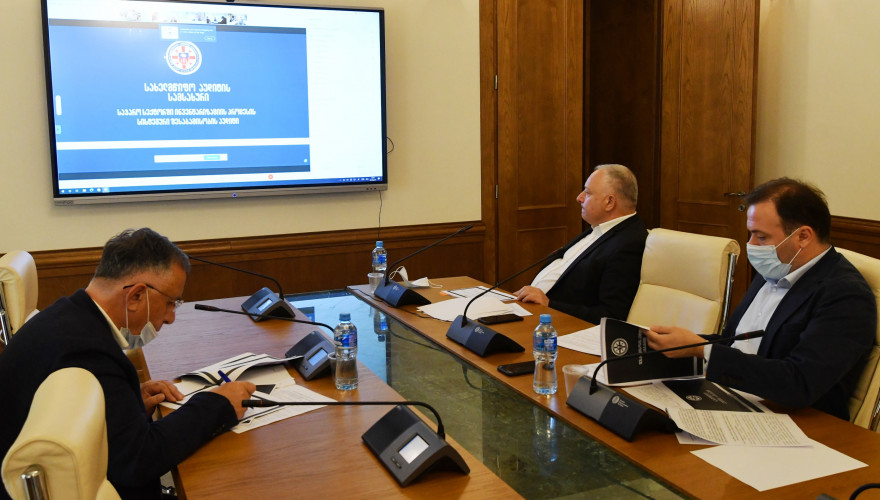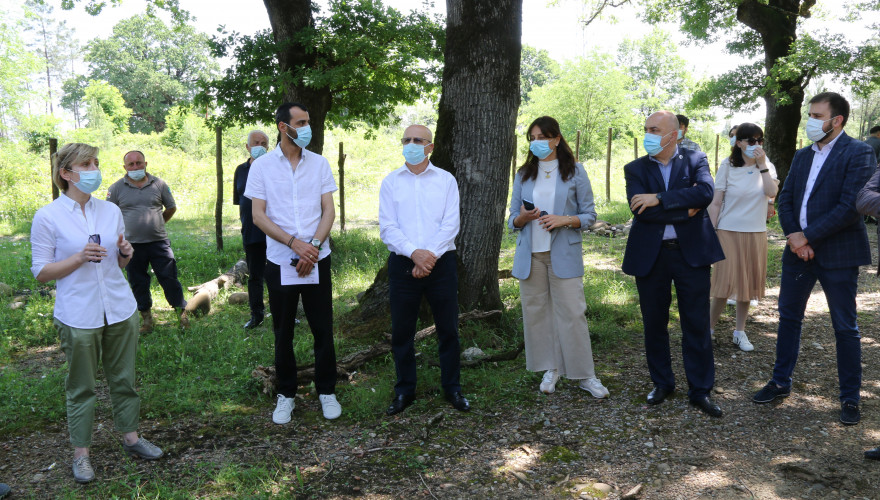Paata Kvizhinadze: the quality and quantity of implemented recommendations by the State Audit Office improved with the Parliament inquiring thereof decisions

The Standing Audit Group on State Audit Service Reports, chaired by the First Chair of the Budget and Finance Committee, Paata Kvizhinadze, convened another sitting to discuss the "Audit Report on Systematic Compliance with the Inventory Process in the Public Sector".
Representatives of the public services in which the State Audit Office conducted a systematic compliance audit of the inventory process participated in the discussion: Deputy Minister of Finance Tsotne Kavlashvili, First Deputy Minister of Economy and Sustainable Development Ekaterine Mikabadze, First Deputy Minister of Environment and Agriculture Giorgi Khanishvili, Deputy Minister of Culture, Sports and Youth Affairs Ioseb Baghaturia, Director-General of the Ilia Chavchavadze National Library of the Parliament of Georgia Giorgi Kekelidze, as well as representatives of various services.
As P. Kvizhinadze noted, the purpose of this process is not to punish anyone - "Our main goal is to correct whatever shortcomings the State Audit Office finds during this or that inspection. Recommendations that are not implemented will be subject to special scrutiny”.
David Gogichaishvili, Deputy Auditor General also addressed the participants of the session.
The Head of the General Services Audit Department of the State Audit Office, Giorgi Kekelishvili introduced the "Systemic Compliance Audit Report on the Inventory Process in the Public Sector".
The objects of the audit were defined as follows: Service Agency of the Ministry of Finance; National Agency of State Property; Ilia Chavchavadze National Library of the Parliament of Georgia; Tbilisi Apolon Kutateladze State Academy of Arts; Georgian State Museum of Theater, Music, Cinema and Choreography - Palace of Arts; Regional Health Center; State Construction Company; Agricultural Logistics and Services Company and Tbilservice Group.
The rapporteur spoke in detail about the audit findings and recommendations: deficiencies in non-financial assets and warehouse management, deficiencies in the inventory process in state-owned companies, deficiencies in identifying and disposing of unusable assets, deficiencies in accounting for agricultural logistics and services, deficiencies in the accounting of library funds, deficiencies in the accounting and inventory of museum valuables, deficiencies in the information to be presented in the accounting and financial statements.
After the recommendations for separate directions, the representatives of the executive authorities made relevant explanations regarding the identified shortcomings and ways to their elimination.
According to the MPs, the State Audit Office shall pay attention to the implementation of the recommendations during the further inspection of the facilities.
Ministries and relevant services were asked to submit timely plans to address the identified problems, recommendations, and proposals made during the meeting.
According to the Head of the Group - "There were many findings, many shortcomings, which must be corrected. 20 recommendations in total were issued. Agencies generally agree with these recommendations, and the main thing now is to meet the requirements of these recommendations, and we will take control of this process. It has been revealed that the accounting of non-financial assets is not perfect, there are no people attached to this process, in general, there is no unified approach to this process. It was decided to maintain a unified system, the Ministries of Finance and Economy were instructed to conduct a unified, modern accounting process”.
As he added, the role of the Parliament is undoubtedly important in this process, because when the State Audit Office makes recommendations to public agencies, which is a modern European standard, some ministries may not take these recommendations seriously, because the State Audit Office is not their supervisor - "However, the Parliament is in charge. The parliament itself instructs the ministry to implement whatever recommendations they agree with. Such an approach has recently led to an increase in the quality and quantity of implementation of the recommendations issued by the Audit Office. We will continue this process. We have already started studying all the reports this year and I am confident that in the near future we will achieve maximum implementation of the recommendations issued by the Audit Service to the relevant entities”.





